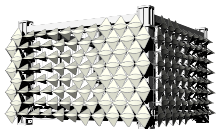Due to their constant physical and design characteristics, previous building envelopes can hardly or not at all react to climatically varying outdoor conditions or changing user requirements. The aim is therefore to develop building envelope systems whose properties are variable, for example in their light transmission, sound absorption, energy reflection, microclimatic effectiveness for the urban space, heat transmission or external design. Such adaptive envelope solutions can automatically or in a controlled manner create the optimum interior and exterior situation for a wide range of environmental situations and user requirements. In the development and implementation of adaptive facades, the focus is on minimising the use of materials, resources and energy for room and urban space air conditioning, complete recyclability in addition to functional optimisation and increased user comfort.
Textile or foil-based multi-layer envelopes offer great potential for the integration of adaptive functions into the façade and therefore represent a focal point of research in the field of adaptive envelopes, in addition to the further development of switchable glazing. The further development of liquid crystal based glasses is carried out with the aim of creating small structured and controllable segments, which can ensure daylight autonomy and glare protection in a better way than the large area switchable glazings known so far. For effective control of the adaptive components, control strategies based on linear programming as well as self-learning AI systems are developed, tested and optimised.
The design of the envelope structures is carried out using various software programs for thermal and radiation balancing. For the quantification of the developed hull and frame systems, the institute has various measuring and testing facilities (hotbox, photo spectrometer, FTIR spectrometer, evaporation test bench, sun simulator) at its disposal. The developed elements can be examined and measured in real façade applications in the institute's own façade test building, and their influence on comfort in the interior and the energy required for conditioning can also be assessed.
Current Research Projects:
Collaborative Research Centre 1244: Adaptive skins and structures for the built environment of tomorrow
Since January 2017, fourteen institutes at the University of Stuttgart have been working in close interdisciplinary collaboration on the question of how, in light of the growing world population and depleting resources, more living space can be created with less material in the future. The objective of CRC 1244 is therefore to find answers to the pressing ecological and social questions of our time for the construction industry. The aim is to optimise the energy, material and emission balance of the load-bearing structure as well as the façade throughout the entire life cycle of the building through adaptivity.
Prof. Werner Sobek (formerly head of the Institute of Lightweight Design and Construction), as initiator, led the CRC 1244 as spokesperson until the end of 2020. Since January 2021, Prof. Oliver Sawodny (currently head of the Institute of System Dynamics) has assumed the role of spokesperson.
Subprojects in the field of adaptive facades:
- A01 – Entwicklung von Methoden und integralen Prozessen für die Planung adaptiver Bauwerke
- A07 – Entwurf und Analyse einer anpassungsfähigen kinetischen Hülle zur Optimierung der Lichtverhältnisse und zur Reduktion der Strahlungseinträge in den Stadtraum
- C01 – Adaptive Gebäudehüllen mit mikro- und raumklimatischer Wirksamkeit




